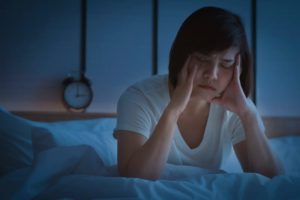Stress and Insomnia
If you or someone you know is in crisis, dial 988 to reach the Suicide and Crisis Lifeline, which provides 24/7, free, and confidential support
Stress and anxiety often lead to insomnia and sleep problems. Insomnia symptoms may begin to dissipate once the stressful situation ends and stress subsides. However, some people fall into a cyclical pattern of sleep loss and daytime anxiety that can contribute to stress. Since stress and sleep problems share such a reciprocal relationship, understanding and addressing one of these issues can often lead to improvements for the other.
How Does Stress Influence Sleep Quality?
Insomnia is a common sleep disorder that can be related to stress. Insomnia is defined as persistent difficulty with sleep onset, maintenance, consolidation, or overall quality. It occurs despite adequate time allotted for sleep on a given night and a comfortable place to sleep. People with insomnia experience excessive daytime sleepiness, fatigue, irritability, and other impairments when they are awake. The prevalence of insomnia varies from study to study. Some research shows that one-third to two-thirds of adults experience bouts of insomnia, with 10% to 15% reporting daytime impairments caused by fragmented sleep.
Elevated stress levels have also been shown to influence the structural organization of sleep , including the duration of each sleep stage. People experiencing chronic stress may experience a decrease in the amount of time spent in deep sleep, and disruptions during REM sleep.
Is Your Sleep a Problem?
Answer three questions to understand if you should be concerned.
Short-Term Insomnia
If someone experiences insomnia symptoms for fewer than three months, this condition is referred to as short-term or acute insomnia. Sudden stressors that can trigger short-term insomnia symptoms may include:
- Interpersonal relationship issues
- Work-related problems
- Financial loss
- Grieving and bereavement
- Diagnosis or symptoms of a disease or other medical condition
Acute stress may also be caused by significant changes made to your bedroom or sleep space. For example, new parents or caregivers may experience insomnia symptoms when sharing their bedroom with their baby for the first time, even if the child is not audibly disruptive. Children may also have sleep problems immediately after they begin sharing their room with a sibling. Visiting or moving to a new location can lead to short-term insomnia as well.
Chronic Insomnia
A person may be diagnosed with chronic insomnia if their symptoms occur at least three times per week for at least three months. Persistent stressors can heavily contribute to chronic insomnia. These stressors may include:
- Problems or dissatisfaction at work
- Divorce and other marital or family difficulties
- The death of a loved one
- Major illness or injury
- Crucial life changes
- Low socioeconomic status
Not everyone develops chronic insomnia due to constant stress, but those with anxiety disorder are at higher risk of experiencing insomnia symptoms. Additionally, changes to one’s sleep schedule that occur due to life events or changes can also lead to insomnia. Once chronic insomnia takes hold, people often feel anxious about sleeping and other aspects of their lives. This increases day-to-day stress, which in turn exacerbates insomnia symptoms.
Sleep Apnea
Hypertension, heart disease, diabetes, and other medical conditions that can often be attributed to stress are predisposing factors for obstructive sleep apnea . This sleep disorder is characterized by a recurring collapse of the upper airway during sleep, which can cause heavy snoring and choking episodes along with excessive daytime sleepiness and other daytime impairments. Like insomnia, sleep apnea can exacerbate stress by disrupting your sleep and wearing you down during the day.

Stress and the Body
The network known as the hypothalamic-pituitary-adrenal (HPA) axis regulates the body’s hormonal response to stressful situations. The hypothalamus — a cluster of nuclei located in the brain— will instruct the pituitary gland to produce steroid hormones called glucocorticoids. Two of these glucocorticoids are cortisol and adrenaline, often referred to as stress hormones.
The body naturally produces cortisol throughout the day, with levels spiking immediately after you wake up and gradually decreasing throughout the day. Elevated cortisol levels are the reason why you often feel hyper-alert during stressful situations, but this can cause you to “crash” once the stress subsides.
Stress can take many forms, but these feelings generally fall into one of three categories .
- Acute stress: This type of short-term stress often accompanies fleeting moments of panic or dread, along with elevated blood pressure and heart rate. Examples include realizing you have missed a deadline for work or school, or nearly being involved in a car accident.
- Episodic acute stress: This type of stress is an accumulation of individual instances of acute stress. People who feel burdened by day-to-day struggles may attempt to alleviate their frustrations through unhealthy behaviors like overeating or binge drinking.
- Chronic stress: This type of stress lasts for prolonged periods of time. Many factors can contribute to chronic stress, including poverty, abuse, and trauma. People tend to internalize these painful experiences, and over time this can wear down the mind and lead to feelings of hopelessness.
How Does Stress Affect Physical Health?
While moderate amounts of acute stress pose little risk to your health, chronic stress can have a major impact on the body. These effects can manifest in various ways throughout different bodily systems.
Cardiovascular
The body’s “fight or flight” response to acute stress causes your heart rate and blood pressure to spike, and increases contractions of the heart muscles. Cortisol and adrenaline act as messengers that regulate these functions. After the period of acute stress is over, these metabolic responses will subside. Chronic stress causes constant elevation of heart rate and blood pressure, and this added pressure on the cardiovascular system can cause long-term health complications. This increases your risk for hypertension, heart attack, and stroke, and can also cause inflammation to your circulatory system.
Gastrointestinal
The gut is loaded with nerves and bacteria that communicate with the brain to regulate mood and promote overall wellness. Stressful moments can interfere with these mechanisms, leading to pain, bloating, and other types of gastrointestinal discomfort. These instances can also lead to loss of appetite, which can have a negative impact on digestive health if it impacts what and when you eat. Additionally, stress can weaken the intestinal barriers that prevent harmful bacteria from entering the stomach, and may cause painful spasms in the esophagus and bowels.
Musculoskeletal
You may notice elevated muscle tension during stressful moments. This reflex is the body protecting you from potential pain or harm, and it is caused by dilating blood vessels in the arms and legs. Chronic stress can cause persistent muscle tension, which in turn may lead to complications such as migraine headaches or pain in the lower back and upper extremities. The discomfort caused by this constant tension can also contribute to long-term stress.
Nervous
During moments of acute stress, the nervous system transmits signals between the pituitary gland and adrenal glands to facilitate production of adrenaline and cortisol. The nervous system also regulates the “comedown” period immediately following a temporarily stressful situation. Chronic stress can overwork your nerves and wear down the body over time.
Reproductive
Stress can cause issues in the reproductive system. Chronic stress may lead to diminished sexual desire, and leave people more vulnerable to cancers and other diseases that affect the reproductive system. Fertility can be negatively affected by chronic stress. Chronic stress in pregnant people can also impact fetal and childhood development.
Respiratory
Stressful situations can lead to both shortness of breath or rapid breathing. Acute stress may trigger asthma attacks and other problems for people with pre-existing respiratory conditions. Over time, chronic stress can lead to more serious respiratory conditions such as chronic obstructive pulmonary disease.
Does Sleep Help Stress?
Getting enough sleep on a nightly basis can alleviate stress quite effectively. Unfortunately, a good night’s rest can be elusive if you are stressed, especially if sleep problems are a major source of your day-to-day anxieties.
There are other measures you can take to relieve stress. These include regularly exercising and maintaining a healthy support network of friends and family. However, adequate sleep is a crucial factor in managing stress levels.
How to Sleep While Stressed
Stress management is key to a good night’s sleep, and you can help lower your stress levels by implementing healthy day-to-day habits. In addition to following a balanced diet and exercising throughout the week, you can alleviate stress through controlled breathing and other relaxation techniques. A healthy work-life balance is important, as is your ability to prevent the internalization of your stressors.
Proper sleep hygiene can also improve your sleep quality and duration, leaving you more refreshed in the morning and prepared to manage stress. Adopting these lifestyle practices can prepare the body for restful sleep .
- Keep a strict sleep schedule: Go to bed and wake up at the same times each day. This includes on the weekends and while traveling.
- Curate an optimal bedroom atmosphere: Your bedroom should have a relaxing effect when you are ready for sleep. You should keep the lights dim and reduce exposure to outside noise. A comfortable temperature is also key. Experts generally recommend 60 to 67 degrees, though 65 degrees is considered the ideal.
- Put away electronics before bed: Televisions, computers, smartphones, and other electronic devices emit blue light that can interfere with sleep. For best sleep results, keep these devices out of your bedroom at all times.
- Reduce stimulant consumption: Avoid consuming nicotine and caffeine in the hours leading up to bedtime. These stimulants can keep you feeling awake when it should be time for sleep.
- Avoid alcohol before bed: Alcohol can also be problematic for sleep. Many people believe drinking helps sleep because of alcohol’s sedative properties, but you may experience sleep fragmentation as your body processes and breaks down the alcohol.
- Get regular exercise: Moderate exercise in the morning or early afternoon can help you wind down and fall asleep more easily at night.
Laying in bed when you are too stressed to sleep can be counterproductive. If you have not fallen asleep within 15 to 20 minutes of going to bed, try getting up and relocating to another area of your residence for a relaxing activity such as reading, meditating, or listening to calming music. Avoid checking your phone and looking at your clock. If your sleep problems persist, see your doctor about an insomnia diagnosis and treatment for your insomnia symptoms.
More Stress Management Tips
Some people find stress relief through cognitive behavioral stress management (CBSM) . This form of short-term therapy pinpoints the way your thoughts and beliefs affect how you behave and interact with the world around you. By identifying irrational or negative thoughts and replacing them with more positive ones, you may be able to change your behaviors and your general outlook.
Studies have shown CBSM can be an effective measure for various groups that tend to experience undue stress, such as professional nurses , people with substance abuse disorders , and individuals living with HIV.
Incidentally, cognitive behavioral therapy for insomnia (CBT-I) has also proven effective for alleviating insomnia symptoms . CBT-i helps people overcome inaccurate or negative beliefs about sleep in order to get more rest and overcome their insomnia. CBT-i emphasizes sleep restriction and the importance of getting out of bed on sleepless nights, as well as proper sleep hygiene, coping skills, and relaxation techniques.
You should see your doctor or another physician immediately if you are experiencing suicidal thoughts, abusing drugs or alcohol, or feeling that you cannot cope with day-to-day life due to stressors.
Medical Disclaimer: The content on this page should not be taken as medical advice or used as a recommendation for any specific treatment or medication. Always consult your doctor before taking a new medication or changing your current treatment.
References
11 Sources
-
Anxiety and Depression Association of America. (n.d.). Sleep Disorders., Retrieved February 1, 2023, from
https://adaa.org/understanding-anxiety/related-illnesses/sleep-disorders -
Bonnet, M., & Arand, D. (2022, April 15). Risk factors, comorbidities, and consequences of insomnia in adults. In R. Benca (Ed.). UpToDate., Retrieved February 1, 2023, from
https://www.uptodate.com/contents/risk-factors-comorbidities-and-consequences-of-insomnia-in-adults -
Division of Sleep Medicine at Harvard Medical School. (2007, December 18). Natural Patterns of Sleep., Retrieved February 1, 2023, from
http://healthysleep.med.harvard.edu/healthy/science/what/sleep-patterns-rem-nrem -
Trakada, G., Chrousos, G., Pejovic, S., & Vgontzas, A. (2008). Sleep Apnea and its association with the Stress System, Inflammation, Insulin Resistance and Visceral Obesity. Sleep Medicine Clinics, 2(2), 251–261.
https://www.ncbi.nlm.nih.gov/pmc/articles/PMC2128620/ -
American Psychological Association. (2020, May). Stress Effects on the Body., Retrieved February 1, 2023, from
https://www.apa.org/topics/stress-body -
A.D.A.M. Medical Encyclopedia. (2022, April 30). Stress and your health. MedlinePlus., Retrieved February 1, 2023, from
https://medlineplus.gov/ency/article/003211.htm -
National Center for Chronic Disease Prevention and Health Promotion, Division of Population Health. (2016, July 15). Tips for better sleep. Centers for Disease Control and Prevention., Retrieved February 2, 2023, from
https://www.cdc.gov/sleep/about_sleep/sleep_hygiene.html -
Lopez, C., Antoni, M., Penedo, F., Weiss, D., Cruess, S., Segotas, M. C., Helder, L., Siegel, S., Klimas, N., & Fletcher, M. A. (2011). A pilot study of cognitive behavioral stress management effects on stress, quality of life, and symptoms in persons with chronic fatigue syndrome. Journal of psychosomatic research, 70(4), 328–334.
https://pubmed.ncbi.nlm.nih.gov/21414452/ -
Shariatkhah, J., Farajzadeh, Z., & Khazaee, K. (2017). The Effects of Cognitive-Behavioral Stress Management on Nurses’ Job Stress. Iranian Journal of Nursing and Midwifery Research, 22(5), 398–402.
https://www.ncbi.nlm.nih.gov/pmc/articles/PMC5637151/ -
Back, S., Gentilin, S., & Brady, K. (2007). Cognitive-behavioral stress management for individuals with substance use disorders: a pilot study. Journal of Nervous and Mental Disease, 195(8), 662–668.
https://pubmed.ncbi.nlm.nih.gov/17700298/ -
Schwab, R. J. (2022, May). Insomnia and excessive daytime sleepiness (EDS). Merck Manual Consumer Version., Retrieved February 1, 2023, from
https://www.merckmanuals.com/home/brain,-spinal-cord,-and-nerve-disorders/sleep-disorders/insomnia-and-excessive-daytime-sleepiness-eds





















